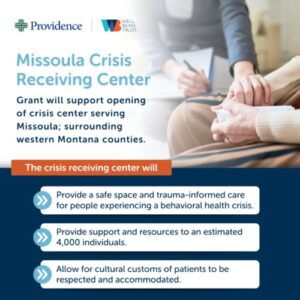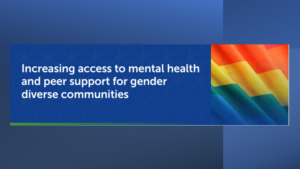While our strategy and focus has changed, our commitment to advancing mental health and well-being for all remains the same
It’s been one year since Providence’s Well Being Trust made a strategic pivot to target our efforts within the Providence footprint of Alaska, California, Montana, New Mexico, Oregon, Texas and Washington.
As a national foundation, our mission remains the same — to advance the mental, social, and spiritual health for all. Yet, health care always starts at a local level. We knew we could make the greatest impact by shifting our focus to the needs of our local patients, caregivers and communities – and sharing what we learn to inform our approach to mental health care and well-being across the nation.
For the last year, we’ve committed to identifying the greatest needs in each of our communities through the eyes of those who know better than anyone else — our frontline caregivers and the patients and families we are privileged to serve. That’s because one message that’s come through loud and clear in how to achieve deep and lasting local change is that there is no one-size-fits-all approach. The greatest health care needs vary from community to community. And the best way to support those needs is to listen to those who are closest to them. Our caregivers not only serve these communities, but they’re active members within them. We empowered our caregivers to drive our work by partnering closely with them.
I’m proud that we’ve honored our commitment by investing nearly $5 million in grant funding this year for innovative and transformative programs that meet the most critical needs of our communities. Through these grants, we aim to support every step of the mental health journey — from prevention and early intervention to crisis stabilization and recovery. These programs tackle our communities’ most pressing needs including:
- Expanding behavioral health access in primary care clinics;
- Reducing substance use disorder-related maternal mortality;
- Improving depression screening, follow-up, and treatment;
- Increasing access to medication assisted treatment for opioid use disorders;
- Increasing access to school-based mental health services, and more.
We’ve partnered with local schools, health centers and community organizations to implement these initiatives.
Our work may start local, but our mission has always been to scale these programs outside the Providence footprint to drive lasting change and improved mental health for all. This work is critical right now. Our nation continues to face a mental health crisis that has been exacerbated by Covid-19. More than one in five adults experience a mental health disorder, according to the CDC, and one in five youth ages 8-15 have experienced a debilitating mental illness. The good news is that these challenges are not intractable or inevitable. We are already seeing the ways in which more comprehensive, community-informed support can have a meaningful impact on people’s lives and well-being.
I’m excited to share that several of our grant initiatives will be rolling out their programs this fall. I look forward to seeing the impact these programs make in our communities and discovering ways we can share what works to inform change within and far beyond Providence’s footprint.
Here are some highlights of what to expect from Well Being Trusts’ grant partners this fall.
Opening of Covenant Children’s Behavioral Health Unit
Up until now, families in West Texas have had to drive three hours to seek behavioral health care for their children – despite the fact that the city is in many ways an economic, educational, and health care hub of the region in Northwest Texas. To address this gap, we supported the opening of Covenant Children’s Hospital and Texas Tech Physicians Child and Adolescent Psychiatry Department’s first unit for youth behavioral health in Lubbock. The behavioral health unit opened in August and is region’s only outpatient unit for children with behavioral health concerns.
The unit will offer services from child and adolescent psychiatrists, child psychologists, licensed professional counselors, social workers, nurses and patient navigators. They’re estimated to reach 3,200 patients each year and provide approximately 10,600 outpatient appointments.
As reported in the Lubbock Avalanche-Journal, Dr. Amy Thompson, Covenant Children’s CEO, described the potential impact of this new community resource amidst an increase in behavioral health issues among area children: “This new unit aims to keep kids as close to home as possible by allowing many to stay and receive treatment in [outpatient or day treatment] programs, rather than having to be hospitalized at an inpatient program – the closest of which is hours away. These new services really elevate the level of care, in a meaningful way, for our community and we can’t wait for the community to be able to benefit from it.”
Opening of Missoula Crisis Receiving Center
A significant portion of Missoula County’s 120,000 residents are Native American. Native and Ingenious people in America experience 2.5 times more serious psychological distress than the general population during a typical month, and have double the suicide rate for young people ages 15-19 compared to their white counterparts, according to Mental Health America. To honor the unique needs and cultural traditions of this population, the crisis center will have a space for patients to perform traditional smudging ceremonies with sage or sweet grass, which are believed to dispel negative energy. Health systems are looking to incorporate “traditional healing practices in a culturally safe environment,” because they are critical as a source of identity, confidence, resilience and strength for Indigenous peoples, and have an important role in promoting individual and community health,” according to an article on improving access to Indigenous practices in health care settings.
Mental Health Education
The Kadlec Regional Medical Center team is providing school districts throughout Benton and Franklin Counties in Washington with mental health training and curriculum on evidence-based programs that can improve student mental health. The program includes a bilingual, county-wide messaging campaign featuring local youth to encourage conversations around mental health, promote help-seeking behaviors, and reduce stigmas, Trainings will be provided to Kadlec caregivers and community partners in both Spanish and English to increase access to mental health promotion and suicide prevention education for Spanish-speaking residents. The effort will include a youth summit convening young people, families, caregivers and teachers across the region to discuss, develop and deploy solutions for youth resilience, hope and peer-to-peer education.
Expanding mental health care for transgender; gender diverse patients
Providence Swedish is launching a new initiative to help fill this gap by expanding mental health care and support for transgender and gender diverse communities. The Providence Swedish Behavioral Health is developing a partnership with LGBTQIA+ community mental health providers and organizations to address the isolation and lack of community connections that contribute to poor mental health among transgender and gender diverse communities.
This initiative also includes designing a peer support program and establishing support groups targeting specific populations, including transgender and gender diverse BIPOC (Black, Indigenous, People of Color) communities, and an all-inclusive/general group for transgender and gender diverse people.
Supporting Patients Across Providence
In addition to our grants, we are supporting our patients’ whole selves – with mental and behavioral health prioritized alongside physical health – throughout the Providence health care system. For example, we’re partnering with telehealth services to expand mental health access in rural communities, which experience higher rates of depression and suicide, but are less likely to have access to mental health services. Like in our other areas of work, we plan to continue to test and spread ideas that can transform the approach to mental health and well-being on our health care system as a whole.
Learn more about the 20-plus innovation and transformation grants here.
What’s Next for Providence’s Well Being Trust
This has been a year of growth and change, as we’ve gone deeper into our communities with a goal of broadening our impact. These programs are driving real, meaningful changes in the lives of our patients and caregivers and throughout our communities.
Our goal for the next three years is to expand access to behavioral health care and support to 1 million people by 2026. As we continue reaching toward that goal in our communities each day, I look forward to sharing what we learn to help improve mental health and well-being for all in our communities and across the nation.






